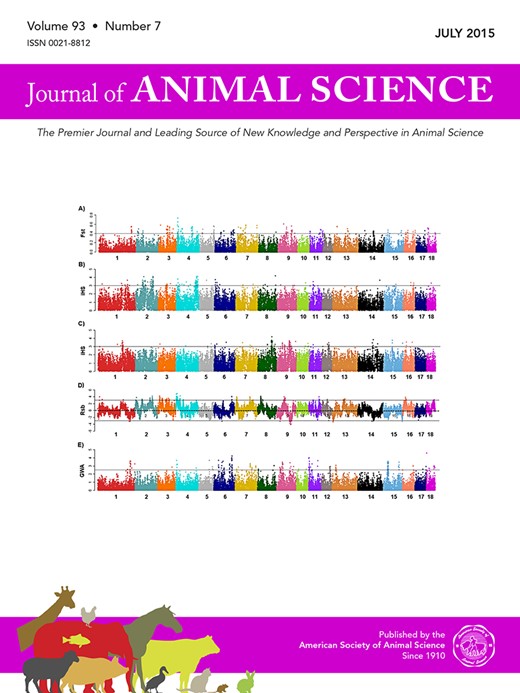-
Views
-
Cite
Cite
T. Maison, Y. Liu, H. H. Stein, Apparent and standardized total tract digestibility by growing pigs of phosphorus in canola meal from North America and 00-rapeseed meal and 00-rapeseed expellers from Europe without and with microbial phytase, Journal of Animal Science, Volume 93, Issue 7, July 2015, Pages 3494–3502, https://doi.org/10.2527/jas.2015-9055
Close - Share Icon Share
Abstract
An experiment was conducted to determine apparent total tract digestibility (ATTD) and standardized total tract digestibility (STTD) by growing pigs of P in canola meal, 00-rapeseed meal, and 00-rapeseed expellers. Canola meal and 00-rapeseed meal are the coproducts produced after the residual oil has been solvent extracted from the prepressed canola seeds and 00-rapeseeds, respectively, whereas 00-rapeseeed expellers is the coproduct from 00-rapeseeds that have been only expeller pressed. Two hundred sixteen barrows (18.0 ± 1.5 kg initial BW) were allotted to 36 diets and 6 replicate pigs per diet. Five samples of canola meal from solvent-extraction crushing plants in North America, 8 samples of 00-rapeseed meal from solvent-extraction crushing plants in Europe, and 5 samples of 00-rapeseed expellers from mechanical-press crushing plants in Europe were used in the experiment. Eighteen diets were prepared by including 40% of each source of canola meal, 00-rapeseed meal, or 00-rapeseed expellers in 1 diet. Eighteen additional diets were formulated by adding 1,500 units of microbial phytase to the diets. The only source of P in the diets was canola meal, 00-rapeseed meal, or 00-rapeseed expellers. Pigs were placed in metabolism crates that allowed for total fecal collection. Pigs were fed at 2.5 times their estimated energy requirement for maintenance. Ingredients, diets, and feces were analyzed for P, and the ATTD and STTD of each source of canola meal, 00-rapeseed meal, and 00-rapeseed expellers were calculated. A value for endogenous P loss of 190 mg/kg DMI was used to calculate the STTD of P. Results indicated that the ATTD and STTD of P for canola meal were not different from values obtained in 00-rapeseed meal, and the ATTD and STTD of P in 00-rapeseed meal were not different from values for 00-rapeseed expellers. The ATTD and STTD of P increased (P < 0.001) from 44.99 and 48.82% to 64.08 and 67.97% for canola meal, from 46.77 and 50.36% to 63.53 and 67.29% for 00-rapeseed meal, and from 44.83 and 48.60% to 69.18 and 72.99%, respectively, for 00-rapeseed expellers by adding microbial phytase to the diets. In conclusion, although the concentration of ether extract is much greater in 00-rapeseed expellers than in 00-rapeseed meal and canola meal, the ATTD and STTD of P for these ingredients are not different, and addition of microbial phytase results in improved digestibility of P in canola meal, 00-rapeseed meal, and 00-rapeseed expellers.





